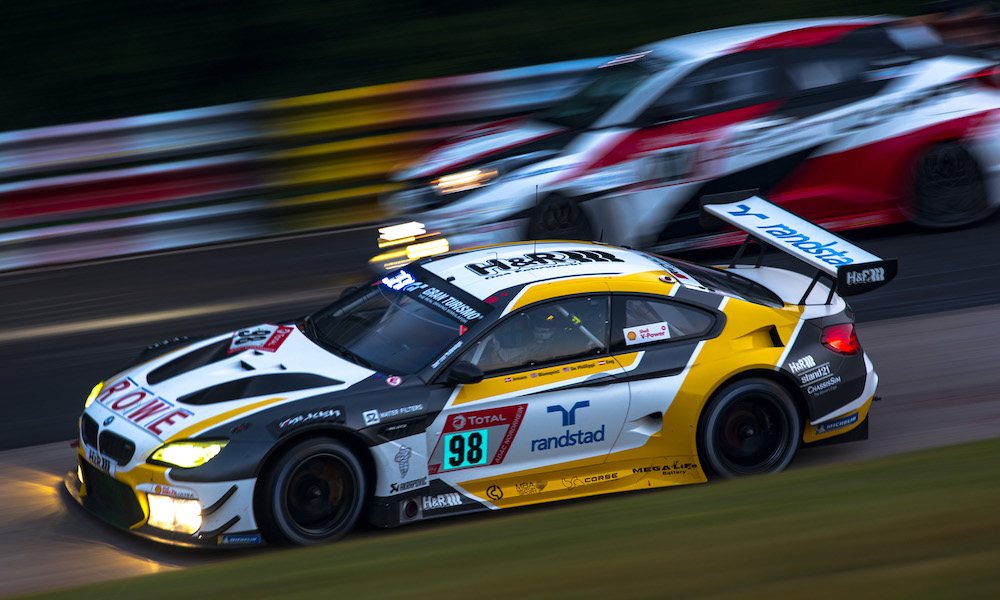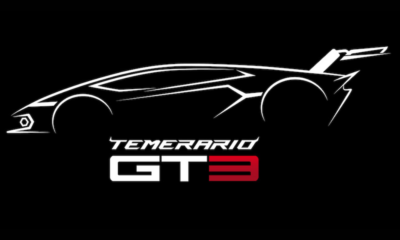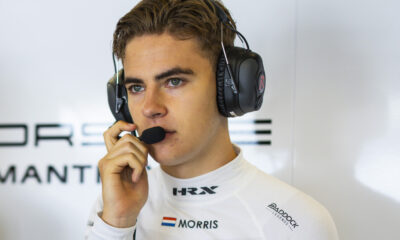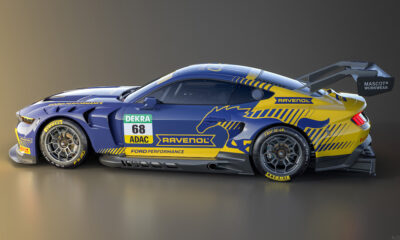
Photo: BMW
The problems that took ROWE Racing’s pair of BMW M6 GT3s out of the Nürburgring 24 in the first four hours were caused by unnecessary pressure placed on its drivers, according to team principal Hans-Peter Naundorf.
Naundorf was highly critical of what he referred to as a “political” Balance of Performance system and the controversial GT3 power reduction for this year’s race, claiming that these factors forced his drivers to take unnecessary risks.
ROWE’s No. 98 car stopped on track after a water pressure leak in the engine cooling system, while the No. 99 car picked up front-end damage early on. It pitted for repairs but an accident on its out lap broke the suspension and caused engine damage.
“The situations with these drop-outs that we have had on the cars, and these accidents, are not really what have been our major concern,” Naundorf told Sportscar365.
“This is just a follow-up on the incidents and political situations we have had over the last four days, [and] after the six-hour qualification race.
“There was intense pressure on the drivers because of the disharmony on performance between the cars.
“The drivers said they had to be aggressive because there were no other chances to be close to average performance.
“Our cars [were] hit more than 20 times in the first three hours, especially in the back because other cars are just much quicker. They just go straight into you out of the corners.
“The guys have been immensely under pressure. The end result is that the pressure was too high, and we were pushed over the limits.”
The 5 percent power decrease for GT3 cars at the Nordschleife this year, aimed to increase safety, was already met with considerable controversy before the N24 from teams and drivers who don’t believe the gap between GT3 and GT4 or Cup machinery is big enough.
“There has never been such a high rate of accidents on the GT3 cars,” said Naundorf. “We have talked about it since the start of the season when the reduction of horsepower was given.
“It’s dangerous what has happened, because it delays the overtaking maneuvers. This happened formerly on the straights, but now [the BoP] delays it to the braking areas.
“And then you’re going to get touched, and you’re going to have accidents. It’s maybe because of higher pressure, politics or whatever, it has to be analysed.
“You do what seems a little change, a 5 percent reduction of horsepower, but the changes that have been made to the BoP on this event have never been so [significant] in the last five years from one event to the next event.”
With GT3 cars closer to what should have been slower machinery in this year’s race, Naundorf says passing traffic was harder than before, causing his drivers to take risks they would normally have avoided so early into a 24-hour enduro.
“If you clearly see that you can’t match the speed of the others, you have to take higher risks,” he said. “Higher risks mean on overtaking and on strategy.
“You don’t want to be going into a 24-hour race and take high risks from the beginning, but it’s pretty clear. The project we’re running, the goal is to have the highest possible result.
“You’re not going to be satisfied if you’re ending up P10, P15 or P20.
“If you have to go on the ultimate limit, what the car can do, and on the risky side, the chances of mistakes are going to be higher.
“For us, we didn’t have a GT3 car, we had a GT3.5 car. We’ve never been touched so much from the back out of slower corners, and then it puts a lot of pressure on the guys.”
VLN Return in Question
ROWE’s plans for the rest of the VLN season are up in the air, with the team having not yet made a decision for the second half of the Nordschleife-based series’ season.
“There has not been a plan to race further races apart from maybe one,” Naundorf explained. “We always make a decision after the Nürburgring 24 on what we’re going to do afterwards in VLN.
“It’s highly dependent on what the next year’s 24-hours project looks like, for what’s being done in the second part of the VLN season.
“The last four months have been very intense. You put a lot of energy into it and a lot of money into it, and them you, two years in a row, you have this kind of outcome.
“It’s by far the worst ending we’ve ever had. You just need to take a breath, really think about what has happened, what could have been done wrong, what you can do better next time, and sort the issues out.
“You want to be competitive and you want to have sporting results, so you just need to think and have a lot of talks about how you can achieve that.”

























